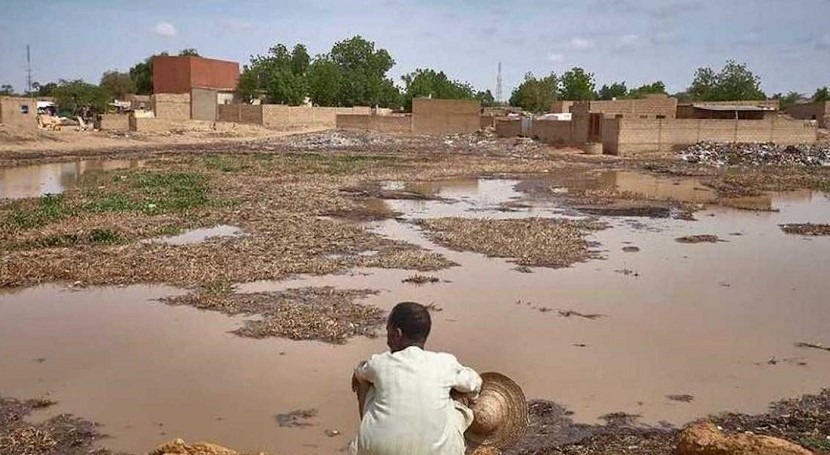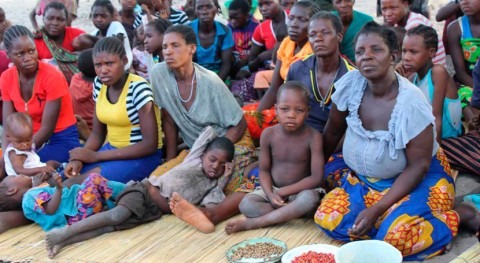When Hama Sorka, a 75-year-old fisherman from Saguia in Niamey, Niger, lost his house and livelihood this past October because of flooding in his neighbourhood, he was able to find refuge at Gamou camp in Niamey.
Hama and his family received multisectoral assistance including shelter, emergency education, health care, water, sanitation and hygiene services from various humanitarian organizations. He now supports his family by selling basic supplies such as soap and mosquito repellent at the camp.
But almost one year later, Hama and the nearly 7,000 other camp residents are calling for a speedy relocation, since the camp was only intended to be a transit site.
“We urge the Government and its partners to speed up the relocation process to a new site,” said Hama.
Needs in the camp are increasing because of the continuing flooding in the area. Tents are in poor condition and at risk of being destroyed by strong winds and heavy rainfall. Women and children remain the most vulnerable and in need of protection services.
As of 24 September, more than 238,000 people have been affected by torrential rainfall and floods in Niger. The country continues to grapple with food insecurity, which affects more than 2 million people. In addition, as of 22 September, the Government to declare a cholera epidemic last month.
Like most countries in the Central Sahel region, Niger is facing issues such as violence, insecurity, and extreme weather conditions due to climate change, which are being compounded by the COVID-19 pandemic. The region is now one of the world’s fastest-growing humanitarian emergencies.
Since the start of the 2021 rainy season in June, torrential rainfall has led to the collapse of more than 12,000 houses, the flooding of nearly 6,000 hectares of cultivable land, and the death of more than 10,000 livestock. Thousands of people have been rendered homeless and vulnerable due to the loss of livelihoods.
Hama and his family are among the most vulnerable people, as they are already facing dire humanitarian situations in camps. Humanitarian organizations are responding to priority needs by providing food, shelter and non-food items. The Flood Contingency Plan for 2021 aims to help about 583,000 people in flood-prone areas.
Government officials have confirmed the start of the operation to transfer some 12,000 people from Gamou camp and Hippodrome camp to the newly established Cité des Enseignants Chercheurs camp in Niamey.

Gamou camp for internally displaced people in Niamey, Niger. © OCHA/Michele Cattani
Cholera outbreak
Niger has also been dealing with a cholera epidemic, which is affecting six out of the eight regions in the country. Some 4,907 cholera cases have been recorded countrywide, including 153 deaths. About 55 per cent of the cases are female.
National health workers and humanitarian medical partners are responding to the epidemic through the management and treatment of cases at cholera treatment centres that have been set up in the affected regions.
The health response also consists of strengthening surveillance activities, the pre-positioning of cholera control supplies, community engagement in hygiene promotion messages, and the distribution of water purification tablets. In addition, the World Health Organization (WHO) has donated equipment and medical kits worth US$308,000 in response to the epidemic.

Health experts visit a cholera treatment site. © WHO/Aminata Kone
While according to WHO standards, the case fatality rate should remain below 1 per cent with early treatment, the Health Cluster is concerned about the efficacy of care being provided to patients, due to the 3 per cent death rate in Niger.
“We need to boost the quality of our services to cholera patients in other to reduce mortality. More experienced health experts are highly required while refresher trainings are being organized for the responding first-line health workers. Time is of the essence and we must act now, and very quickly,” said Dr. Tambwe Didier, the Health Cluster Coordinator in Niger.
UN CERF funding helps to provide support
On 21 September 2021, Emergency Relief Coordinator Martin Griffiths allocated US$8.5 million from the UN Central Emergency Response Fund to support the response to people affected by internal displacement, floods and cholera in Niger.
The funds will help provide health care, water and sanitation, hygiene, shelter, non-food items, protection and education support to more than 720,000 people. This includes rapid assistance to more than 81,600 vulnerable people, including newly displaced people, returnees and members of host communities in the regions of Diffa, Maradi, Tahoua and Tillabéri.
UN agencies – including UNICEF, WHO, the International Organization for Migration (IOM) and the UN Refugee Agency (UNHCR) – and their partners will implement the related projects.








